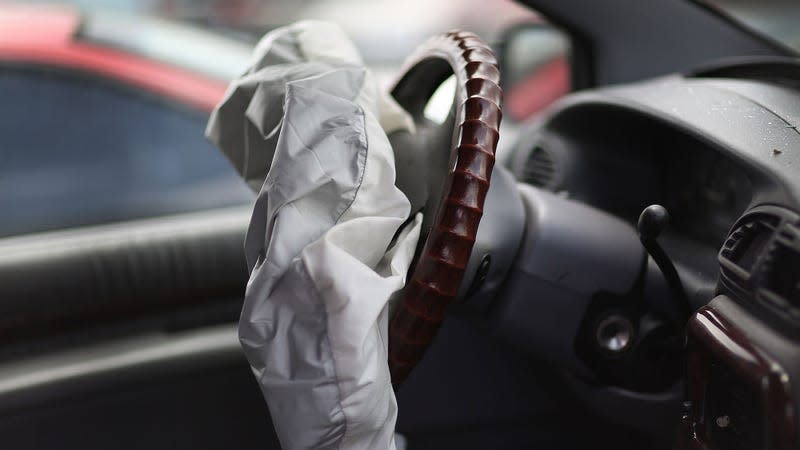The Morning Shift: NHTSA's Sluggishness Issuing Recalls Is Getting On Some Nerves

It’s Friday, June 2, 2023 and this is The Morning Shift, your daily roundup of the top automotive headlines from around the world, in one place. Here are the important stories you need to know.
1st Gear: NHTSA Not So Fast
With automotive recalls being as frequent and pressing as they are these days, it’s imperative that the National Highway Traffic Safety Administration move through its investigations as efficiently as possible. That’s exactly what’s not happening, judging by NHTSA’s eight-year-long probe into ARC Automotive’s potentially dangerous airbag inflators that still hasn’t produced any meaningful action. The U.S. Department of Transportation inspector general’s office has had enough, calling its colleagues out this week in an audit seen by The Wall Street Journal:
Read more
The audit, covered in a report dated May 31 by the U.S. Transportation Department’s inspector general’s office, recommended that the National Highway Traffic Safety Administration implement a plan for meeting its targets for completing auto-defects investigations and ensure documents related to those probes are uploaded to its public website for transparency and accountability.
The lack of timely investigations may limit NHTSA’s ability to identify and respond to rapidly evolving or serious auto-safety risks, the report said. “Further, delays in completing safety defect investigations could result in unidentified motor vehicle defects and safety risks to the traveling public,” it added.
Specifically, the report took aim at NHTSA not holding itself accountable to its own deadlines as well as its poor data-keeping protocols, including a reliance upon “aging, decentralized databases.” Sophie Shulman, NHTSA’s deputy administrator, stated in the regulator’s defense that just because a probe takes longer than planned doesn’t mean action won’t be taken before it’s deemed complete. But eight years is too long, no? Continuing on:
NHTSA said that it has already implemented most of the watchdog’s recommendations, and that the changes it began making in 2016 have led it to address safety risk faster than in the past. The agency added that it is continuing efforts to identify safety issues more quickly and engage with manufacturers earlier in the process to conduct more timely recalls.
The inspector general office’s findings follow reporting last month by the Journal, which found that the average length for NHTSA’s open investigations is now the highest in the agency’s 52-year history. Many safety probes launched by NHTSA have been open for three and four years, the Journal found in an analysis of publicly available data.
Among the longest of the government’s probes is NHTSA’s eight-year investigation into air-bag inflators made by auto-parts supplier ARC Automotive, the Journal found.
At the moment, NHTSA has put it to ARC Automotive to answer a series of questions in a special order about the safety of its inflators. If ARC doesn’t respond by June 14, it’ll risk a “maximum fine of about $131.6 million and potential criminal penalties.”
2nd Gear: Hyundai, Kia’s Fix Is Broken
The software update Hyundai and Kia issued for cars with keyed ignitions to combat rising theft of the brands’ vehicles apparently is not playing nice with remote start, according to Automotive News:
According to a service bulletin sent from Kia America to its dealers in February, the company identified a compatibility issue involving vehicles equipped with remote start accessories.
Another bulletin, issued last week, said the problem has not been remedied.
A spokesperson for Kia confirmed that the issue persists, but the company expects to release a new version of the software update this month that is compatible with the subset of vehicles equipped with remote start. The automaker remains “confident” the upgrade works as designed for eligible models, the spokesperson said.
The same software update is also available for older Hyundai models not equipped with an antitheft device.
The most recent Hyundai service bulletin sent to dealers in April also advises that vehicles with aftermarket or add-on alarms or remote start systems may not operate normally if the software patch is installed.
A Hyundai spokesperson told Automotive News that a small number of Hyundai vehicles equipped with remote start systems may not operate normally when used in conjunction with the antitheft software, and that engineers are working to resolve the conflict in communication with dealers and affected customers.
The patch works by essentially killing ignition while the car is locked, so it’s not surprising that it wouldn’t be compatible with remote start accessories, especially aftermarket ones. This is a real pickle Hyundai and Kia have gotten themselves into, isn’t it?
3rd Gear: Infiniti’s Got A New Boss
That would be former Nissan Mexico head Jose Roman, who will now oversee the luxury brand around the world, and maybe try to get it back on some radars. From Auto News, again:
Infiniti’s newest leader starts on July 1 and will be based at the company’s global headquarters in Yokohama, Japan, just south of Tokyo. Roman, 56, will also serve as a senior vice president at the parent company and report to Asako Hoshino, Nissan’s global sales chief and executive vice president.
“Jose’s human-centric leadership style, paired with a wealth of experience gained across diverse markets, will be invaluable for Infiniti to move to the next bright chapter,” Hoshino said in the statement. She credited Roman with consolidating Nissan’s market leadership in Mexico, where under his lead the brand achieved its 15th consecutive year atop the country’s sales chart.
During his tenure, Roman introduced Nissan’s e-Power hybrid powertrain system to the region.

 Yahoo Autos
Yahoo Autos 